While you buy by means of hyperlinks on our web site, we might earn a fee. Right here’s the way it works.
You’re having fun with a pleasant, peaceable stroll when abruptly your canine dives headfirst into the unspeakable. Earlier than you may react, they’ve swallowed it, tail wagging like nothing’s mistaken. In the meantime, you’re left questioning the query many canine dad and mom ultimately ask: Why do canines eat different canines’ poop?
The excellent news? You’re not the one one coping with this nightmare. Even higher? Science truly has some solutions.
10 Causes Canine Eat Different Canine’ Poop
In line with a survey examine revealed in Veterinary Drugs and Science in 2018, researchers led by Dr. Benjamin Hart, a board-certified veterinary behaviorist on the College of California, Davis, discovered that 16% of canines sampled had been critical poop eaters, consuming different canines’ feces often.
It’s believed that canines eat different canines’ poop, a conduct coined coprophagia, attributable to a mixture of instinctual, dietary, and behavioral causes.

1. A Leftover Survival Intuition
Lengthy earlier than kibble bowls and Amazon deliveries, wild canines survived by scavenging. When meals was scarce, feces weren’t waste — the droppings had been a second shot at energy and vitamins.
Some researchers consider this historical conduct nonetheless lingers in domesticated canines. Regardless that your Lab simply ate a premium grain-free dinner, his DNA nonetheless whispers, “By no means waste an opportunity at meals.”
2. Mother Confirmed Them How
For the primary few weeks of life, mom canines lick their puppies clear and eat their feces. This isn’t some odd craving. It retains the den sanitary and hides scents from predators.
Puppies raised watching mother do that typically don’t “unlearn” the conduct. It’s like youngsters who by no means cease biting their nails — it begins as intuition, then sticks as a behavior.
3. Smells Like Leftovers
Canine don’t share our disgust reflex. To them, poop can truly scent appetizing, particularly if the opposite canine is on a protein-rich weight loss plan.
Analysis reveals canines are most interested in stools which can be lower than 48 hours previous, as a result of brisker droppings comprise extra intact vitamins. To us, it stinks. To them? It smells like leftovers value sampling.
4. Lacking Vitamins Or Digestive Points
Typically poop-eating isn’t about intuition; it’s about want. In case your canine’s physique isn’t absorbing vitamins properly, feces can seem like a “second go” at dinner.
Attainable culprits embrace:
- Pancreatic enzyme deficiency: Canine with this situation (EPI) can’t produce sufficient enzymes to interrupt down fats, protein, and carbs to be absorbed by the physique.
- Intestinal parasites: Worms like roundworms or hookworms steal vitamins straight out of your canine’s intestine, leaving them hungrier and extra prone to hunt down additional energy from feces.
- Normal malabsorption issues: Inflammatory bowel illness and different intestinal points can stop your pup from totally processing meals.
- A poorly balanced weight loss plan: Low-quality kibble or home made diets with out correct formulation can go away dietary gaps.
Vet Tip: In case your canine abruptly develops this behavior, or if it turns into obsessive, schedule a vet examine. Easy bloodwork or stool exams can uncover hidden issues.
5. Boredom = Unhealthy Decisions
Canine are sensible. After they don’t get sufficient every day bodily and psychological stimulation, they create their very own hobbies like poop-eating. An under-exercised Husky might chew drywall. A bored Beagle might eat… properly, droppings.
Each are cries for enrichment. Research present canines crave psychological stimulation as a lot as bodily train. With out it, they create “video games,” some harmful, some disgusting.
6. Drama = Consideration
Canine discover what will get a response. If each time your pup chomps, down you shriek, dash over, or yank them away, they’ve realized one factor: poop-eating equals immediate consideration.
The repair? Don’t give them the drama. Quietly redirect and reward once they ignore the pile. To your canine, calm coaching beats your horrified response.
7. Underlying Medical Issues
Typically poop-eating isn’t only a quirky behavior—it’s a pink flag for one thing occurring inside your canine’s physique. A number of well being points can set off or worsen coprophagia:
- Diabetes: Canine with diabetes typically really feel always hungry as a result of their our bodies can’t correctly use glucose. That starvation might drive them to eat something, together with feces.
- Hypothyroidism: An underactive thyroid slows metabolism however may also disrupt urge for food and digestion, typically resulting in odd food-seeking behaviors.
- Cushing’s illness: Extra cortisol ramps up a canine’s urge for food, making scavenging and poop-eating extra possible.
- Liver illness: The liver processes toxins and vitamins. When it’s not working proper, waste merchandise can construct up within the physique, altering urge for food and resulting in uncommon consuming habits.
- Anemia: Canine with low pink blood cell counts typically really feel weak and crave non-food gadgets, together with feces, in an unconscious try to “repair” their deficiency.
- Dementia (Canine Cognitive Dysfunction): Senior canines with dementia typically lose their regular sense of what’s acceptable to eat. Poop-eating can seem abruptly in older pets who by no means did it earlier than.
In case your canine’s poop-snacking is new and comes with weight reduction, thirst adjustments, or power dips, it’s time for a vet go to.
8. When It’s Not Simply Poop: Pica
In case your canine isn’t solely consuming poop however additionally gobbling up rocks, grime, socks, or different non-food gadgets, it might be a situation referred to as pica. Not like typical poop-snacking, pica is often an indication of a deeper medical or behavioral downside.
- Medical causes: anemia, intestinal points, or nutrient deficiencies.
- Behavioral causes: nervousness, stress, or obsessive-compulsive behaviors.
Pica will be harmful — swallowed rocks or toys may cause intestinal blockages, which regularly require surgical procedure. In case your canine’s “bizarre snacking” goes past feces, name your vet. They might run bloodwork or imaging to rule out medical causes earlier than tackling the behavioral aspect.
9. Residing With A Sick Or Senior Canine
In some households, a wholesome canine will begin consuming the stool of an older or sick companion, particularly if that canine struggles with accidents.
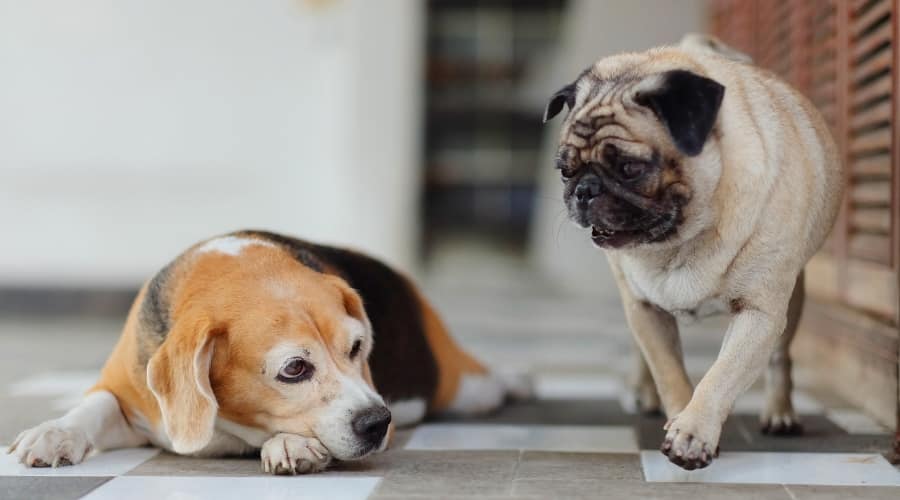
Consultants recommend this comes from an historical intuition to shield the pack. Cleansing up after weaker members saved predators from catching the scent.
At residence, that survival drive interprets into your youthful canine “serving to” their senior sibling. It’s not revolt; it’s intuition.
10. Canine “Janitors” Don’t Like Messes
Canine typically eat poop to tidy up their area, particularly in the event that they’re confined to small yards or not taken out sufficient. In multi-dog households, it may be a bizarre however sensible type of housekeeping.
That is particularly widespread in canines who’ve been punished for accidents. By making the proof disappear, they really feel safer. Of their thoughts, they’re problem-solving. In ours, it’s simply one other gross shock.
Is It Harmful If My Canine Ate One other Canine’s Poop?
If the thought of your canine consuming poop isn’t dangerous sufficient, right here’s a scarier reality: coprophagia can expose canines to parasites, viruses, and micro organism. A few of these infections are gentle, whereas others will be life-threatening. Puppies, seniors, and immunocompromised canines are particularly in danger.
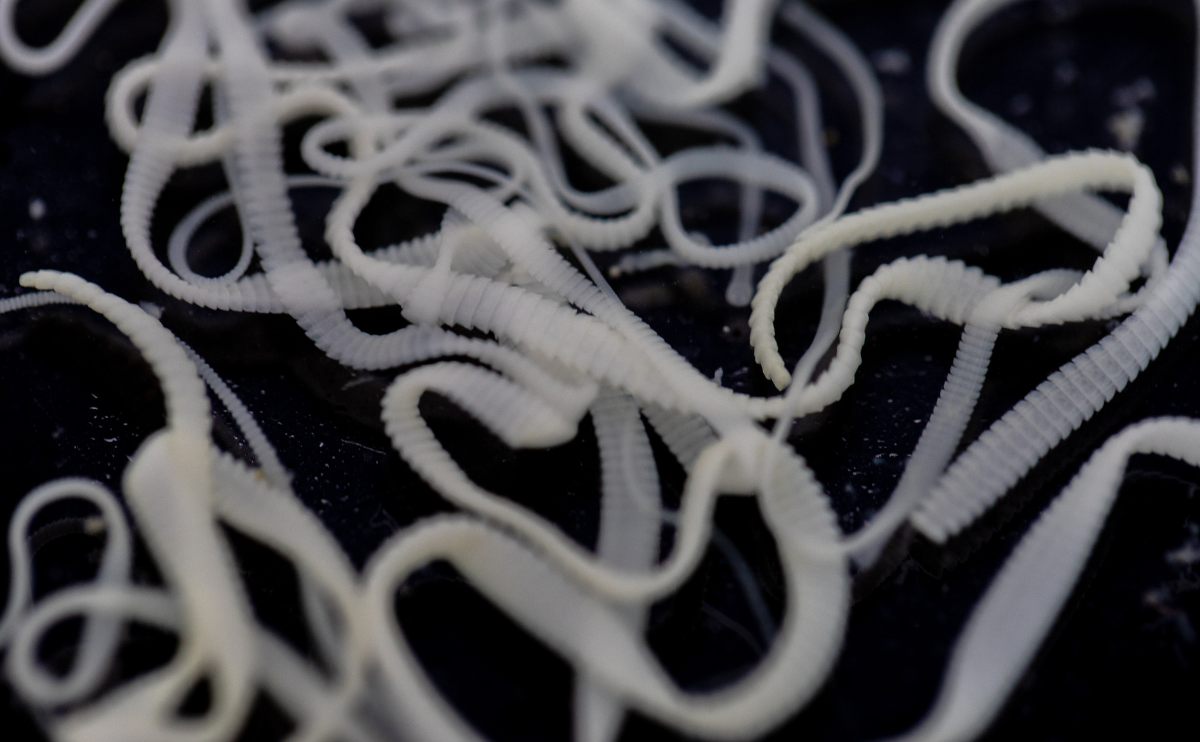
Creepy Crawlers In Feces
When canines eat the feces of an contaminated animal, they danger ingesting stay worms or eggs. Frequent offenders embrace:
- Hookworms – Tiny bloodsuckers that stay within the small gut. They trigger anemia, weak spot, and digestive upset. Hookworms may even infect people.
- Roundworms – Lay 1000’s of eggs that survive in soil for years, making reinfection widespread. Roundworms are particularly harmful for puppies.
- Tapeworms – Flat, segmented worms that steal vitamins out of your canine, typically resulting in weight reduction and malnutrition.
- Whipworms – Dwell within the massive gut, triggering diarrhea, weight reduction, and anemia. Eggs can survive within the setting for a very long time, making reinfection widespread.
Necessary: All of those parasites require veterinary remedy or prevention — residence treatments received’t minimize it.
Microscopic Menaces
Not all poop-borne infections come from worms. Microscopic organisms referred to as protozoa may cause extreme intestinal illness:
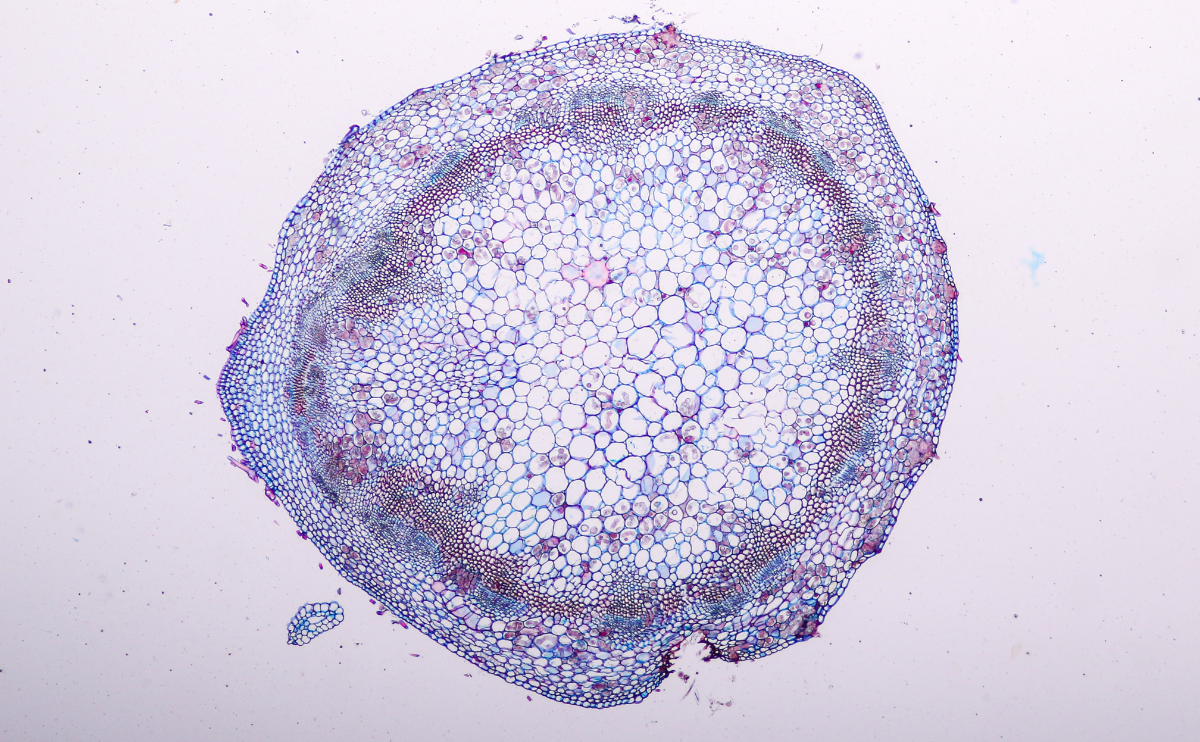
- Giardia – Recognized for inflicting watery, foul-smelling diarrhea. It spreads simply in kennels, canine parks, and multi-dog households.
- Coccidia – Frequent in puppies, resulting in diarrhea and dehydration if untreated.
- Cryptosporidiosis – Could cause extreme, extended intestinal upset. It’s additionally zoonotic, which means people can catch it.
The Germs That Linger In Poop
Feces doesn’t simply carry parasites. It might harbor viruses and micro organism that linger within the setting for weeks or months.
- Parvovirus – A number one killer of puppies, parvo causes vomiting, bloody diarrhea, and dehydration. Even with remedy, it may be lethal.
- Infectious Canine Hepatitis (Adenovirus 1) – Adenovirus is unfold by means of feces, urine, and saliva. This virus causes irritation of the liver. There’s no treatment—solely supportive care.
- Salmonella – Causes diarrhea, fever, and stomach ache. Canine can go it to people, making it a family danger.
- E. coli – Some strains trigger extreme diarrhea and cramping in canines. Like Salmonella, it could actually unfold to individuals.
- Campylobacteriosis – A bacterial an infection that results in extreme diarrhea, particularly in puppies. It’s additionally zoonotic, which means individuals can catch it too. Good hygiene (handwashing, disinfecting, fast cleanup) is essential.
Necessary: Be sure to maintain your pup’s vaccinations updated. The DHPP vaccine offers immunity for parvovirus and adenovirus, in addition to canine distemper virus and parainfluenza.
Is Coprophagia Ever A Medical Emergency?
Most instances aren’t, however typically, sure. Name your vet straight away in case your canine reveals:
- Vomiting or diarrhea
- Blood in stool
- Sudden lethargy
- Lack of urge for food
If you recognize the poop they ate got here from a sick canine or an unknown supply, it’s higher to err on the aspect of warning.
6 Suggestions On How To Cease Poop-Consuming (With out Shedding Your Sanity)
Breaking the behavior of poop-eating takes persistence and consistency. The excellent news? Most canines will be redirected with the right combination of coaching, administration, and enrichment. These methods not solely minimize down on gross snack assaults but additionally enhance your canine’s general conduct and well-being.
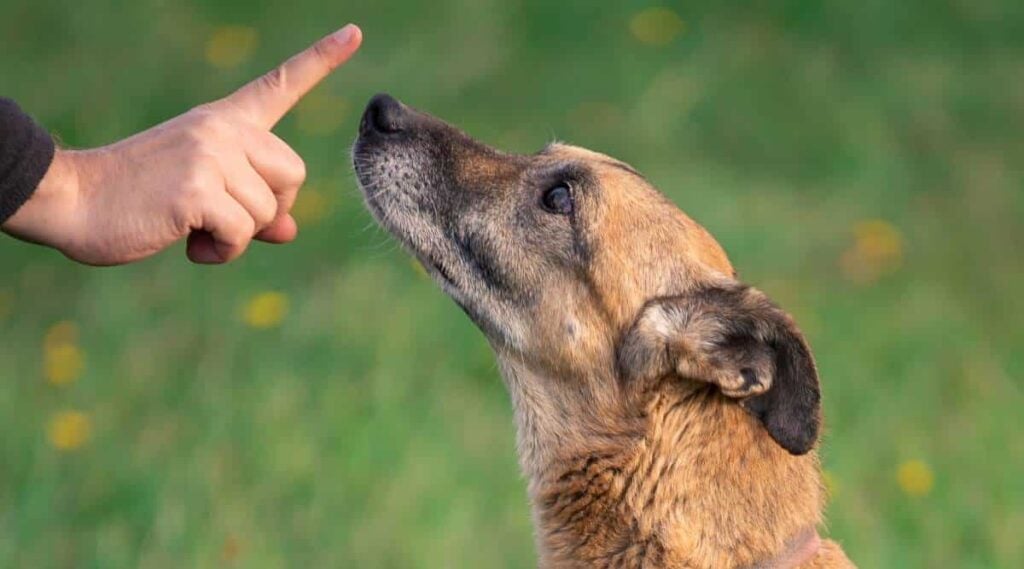
Listed below are six methods to get began:
1. Get Skilled Recommendation
Typically poop-eating is an indication of one thing deeper. That’s why the primary cease ought to at all times be your veterinarian. A full checkup can rule out (or diagnose) underlying points like parasites, malabsorption, or different medical circumstances.
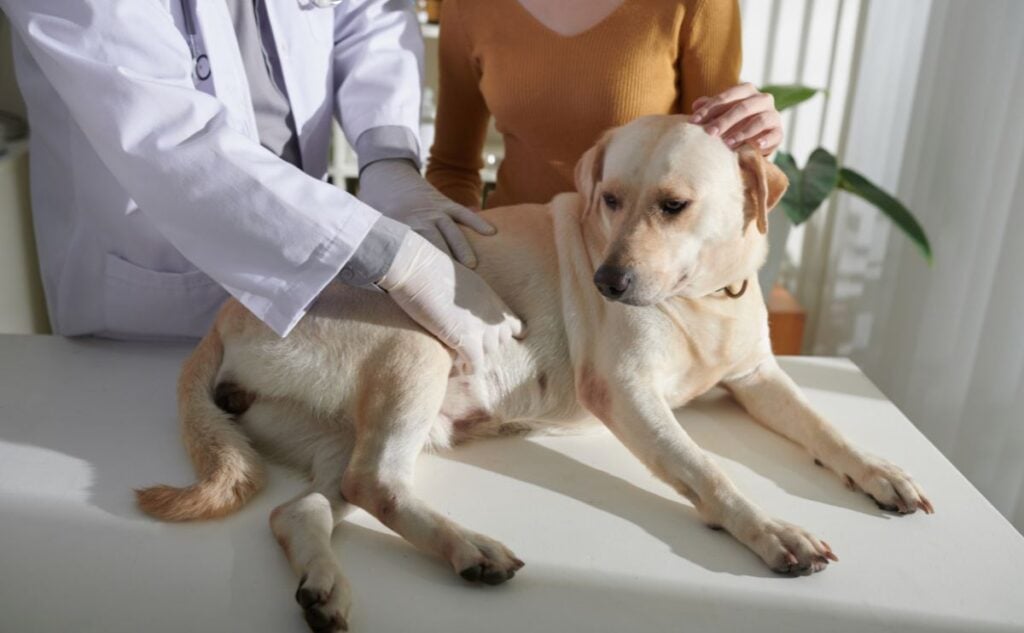
In case your canine additionally reveals pink flags akin to weight reduction, lethargy, or blood within the stool, a vet go to is non-negotiable.
As soon as medical issues are off the desk, the subsequent step is conduct. Some canines want greater than at-home coaching; they want structured steerage from knowledgeable. A licensed coach or veterinary behaviorist can:
- Pinpoint the basis trigger (boredom, nervousness, attention-seeking)
- Design a customized coaching plan to your canine
- Train you strategies to handle the conduct persistently
For busy homeowners or these with out native sources, on-line coaching programs are an important choice. They will let you work at your individual tempo whereas getting knowledgeable recommendation.
Professional Tip: Examine whether or not your pet insurance coverage covers coaching or behavioral consultations. Some plans do, particularly if it’s tied to a recognized medical or behavioral situation.
2. Train A Rock-Stable “Depart It”
That is your primary software for walks. As soon as your canine understands “go away it,” you’ll have a dependable option to steer them away from temptations earlier than catastrophe strikes.

Learn how to educate it:
- Maintain a deal with in a closed fist. Let your canine sniff, lick, paw, or nudge. Say nothing.
- The second they again off, mark the conduct (“Sure!” or a click on) and reward with a deal with out of your different hand.
- Stage up: place a deal with on the ground and canopy it together with your hand. Solely reward when your canine backs off. Progressively uncover the deal with, then observe open air with distractions.
With sufficient observe, “go away it” turns into second nature — a lifesaver once you spot a suspicious pile mid-walk.
Professional Tip: Observe “go away it” with totally different temptations, like meals, toys, even dropped crumbs, so your canine generalizes the command to poop, too.
3. Management The Setting
Typically prevention is the only resolution. The much less entry your canine has, the much less alternative there’s to observe the behavior.
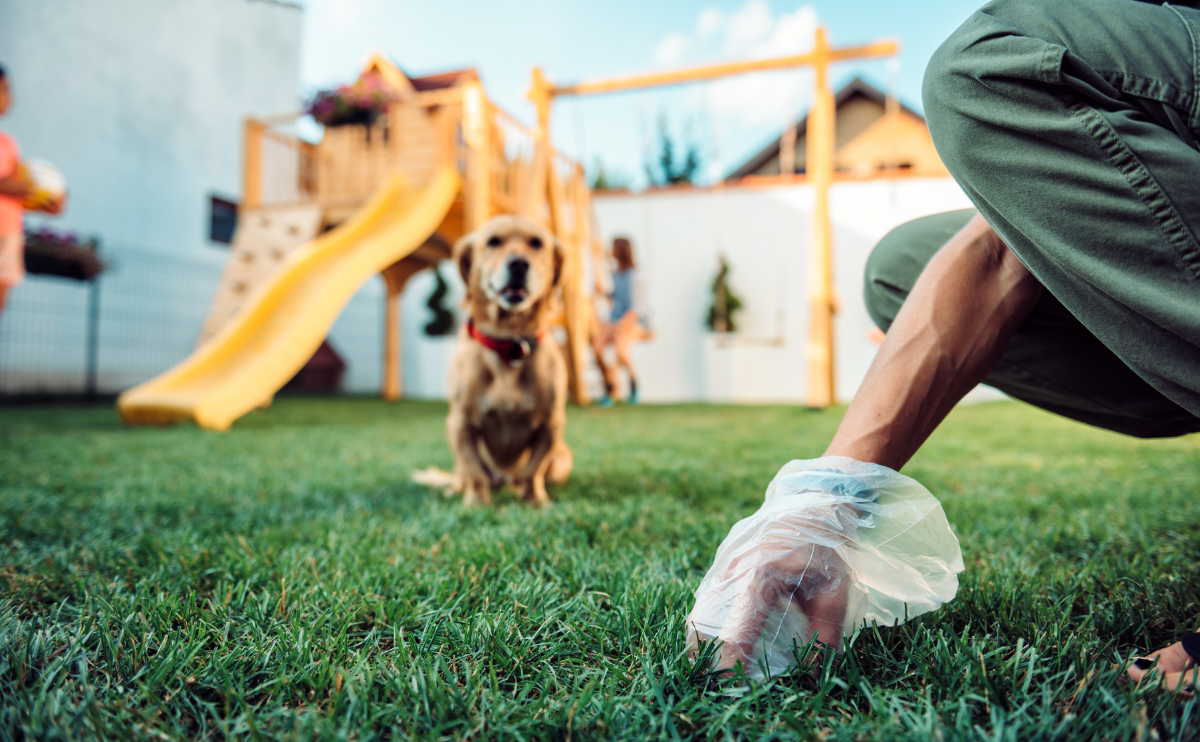
- Choose up poop in your yard as shortly as attainable.
- At canine parks, avoid corners the place feces are likely to pile up.
- Hold your canine on a shorter leash in high-risk areas so you may redirect earlier than they dive nose-first.
Managing the setting received’t “repair” the behavior alone, nevertheless it reduces temptation whilst you work on coaching.
4. Repair Weight loss plan Gaps
Some canines eat poop as a result of their physique isn’t getting or absorbing what it wants. Even when your canine’s meals is high-quality, digestive points can go away vitamins behind in feces, making it scent edible.
Speak together with your vet about including:
Did You Know? Canine with exocrine pancreatic insufficiency (EPI) are infamous poop-eaters till they’re handled with enzyme dietary supplements. At all times rule out medical causes if the behavior begins abruptly.
5. Beat Boredom Earlier than It Begins
Boredom will be one of many greatest triggers for poop-eating. A canine with too little to do will invent their very own leisure, typically within the type of “gross hobbies.”
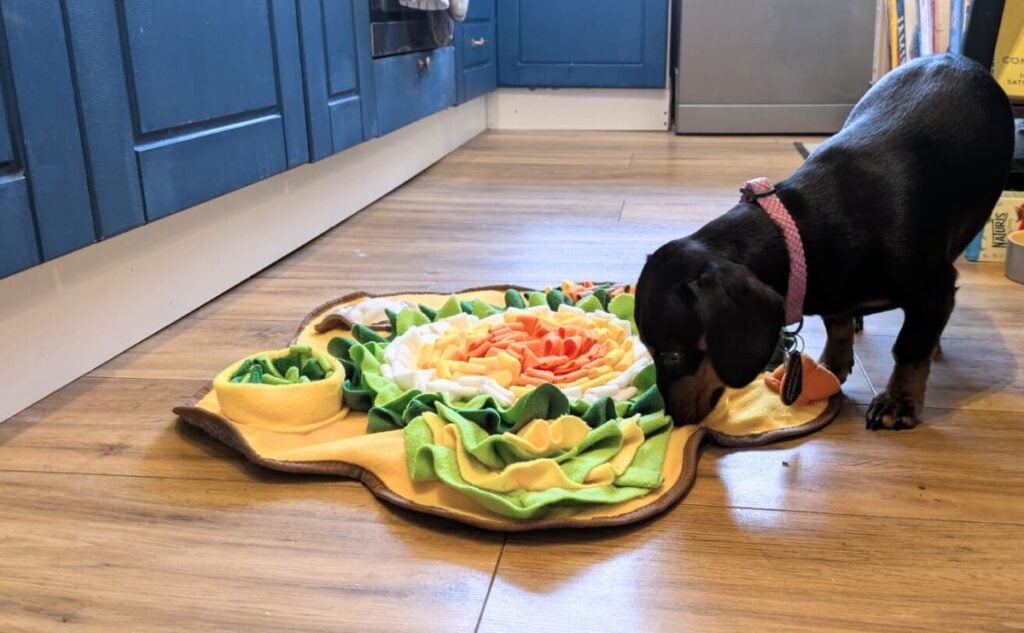
Methods to combat boredom:
- Supply meals puzzles, lick mats, or snuffle mats for mealtime.
- Rotate interactive toys each few days to maintain issues novel.
- Schedule extra train, particularly actions that problem each physique and mind.
- Incorporate nostril work: conceal treats round the home or yard and let your canine sniff them out.
6. Attempt Style Deterrants
For some canines, poop-eating is about taste. If that’s the case, you may theoretically make the “snack” much less interesting. For multi-dog households (or for canines who eat their very own poop), some individuals swear by pineapple or business complement deterrents.
Nevertheless, the science isn’t so certain.
In a 2008 examine revealed within the Journal of Utilized Companion Animal Conduct, researchers discovered that poop-eating deterrent drugs, like For-bid and Deter, had very blended outcomes. Nevertheless, youthful canines responded higher to remedy than older ones.
The simplest “remedies?” Stopping entry to feces was the best manner of stopping the conduct, adopted by rewarding good conduct and distracting the canine from the feces.
Fast Repair Guidelines: 6 Methods to Cease Poop-Consuming
With these six methods, you’ll have a full toolkit for tackling poop-eating and conserving your sanity intact.
- Begin with a vet examine to rule out medical causes.
- Train a dependable “go away it” command.
- Handle the setting: clear yards, keep away from poop zones.
- Repair weight loss plan gaps with probiotics, enzymes, or fiber.
- Beat boredom with sniffing video games, toys, and train.
- Attempt style deterrents like pineapple or For-Bid.
What The Science Says About Poop Eaters
For puppies, poop-eating is often simply a part of their “every part goes within the mouth” exploration stage. Whereas most pups are content material to smell and examine droppings, some can’t resist taking issues a step additional and giving them a style take a look at.

Listed below are some curious (and barely gross) info that Benjamin and Lynette Hart discovered of their examine of canine poop eaters:
- Different canines’ poop is extra interesting. About 85% of examine topics had been glad to pattern one other canine’s droppings however prevented their very own.
- Texture issues. Canine are far much less prone to contact free or watery stool. What actually grabs their consideration? Agency, well-formed poop—and frozen droppings rank excessive as a favourite.
- Recent is “finest.” Round 92% of poop-eating canines want it no multiple or two days previous.
- Extra canines, extra poop eaters. In single-dog households, solely about 1 in 5 canines develops this behavior. In properties with three canines, that quantity jumps to 1 in 3.
- Coaching isn’t the problem. Canine who eat poop aren’t any tougher to housebreak than non-poop eaters.
- Gender variations. Feminine canines are extra liable to it, whereas intact males are the least possible offenders.
- Meals thieves are sometimes poop eaters. Canine who swipe meals off tables or counters usually tend to indulge on this conduct.
Breeds Most Susceptible To Coprophagia
Not all canines are equally tempted by poop. Actually, the 2018 Hart examine broke down outcomes by breed and located some clear developments. Hounds and Terriers topped the record because the teams most certainly to eat feces.
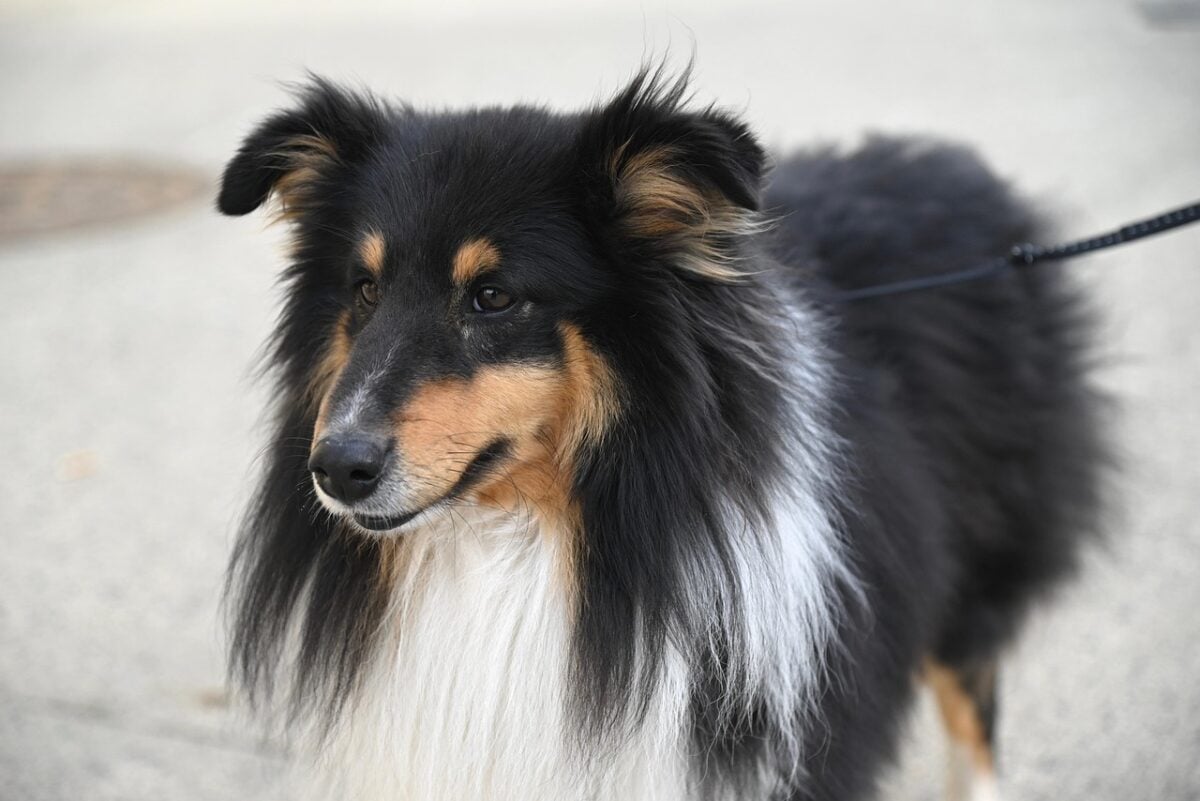
Why these teams? Hounds had been bred to trace, path, and scavenge, typically utilizing their highly effective noses to smell out something remotely edible. Terriers, however, are recognized for his or her intense power and curiosity. Put that along with a scarcity of impulse management, and also you’ve acquired the proper recipe for poop-snacking.
When taking a look at particular breeds, the examine discovered:
- Shetland Sheepdogs had been the worst offenders, exhibiting the very best charges of coprophagia. Their herding background might make them extra liable to “clean-up” behaviors.
- Different high-ranking breeds included a number of kinds of Terriers, Basset Hounds, and Beagles — canines with robust noses or excessive prey drive.
- Poodles (all sizes), surprisingly, had been among the many least prone to indulge. Their fastidious nature and selective tendencies might shield them from creating the behavior.
Continuously Requested Questions
Nonetheless have questions? You’re not the one one. These are a few of the most typical (and most Googled) issues from canine dad and mom. When you don’t see yours right here, drop it within the feedback — we’d love to listen to from you.
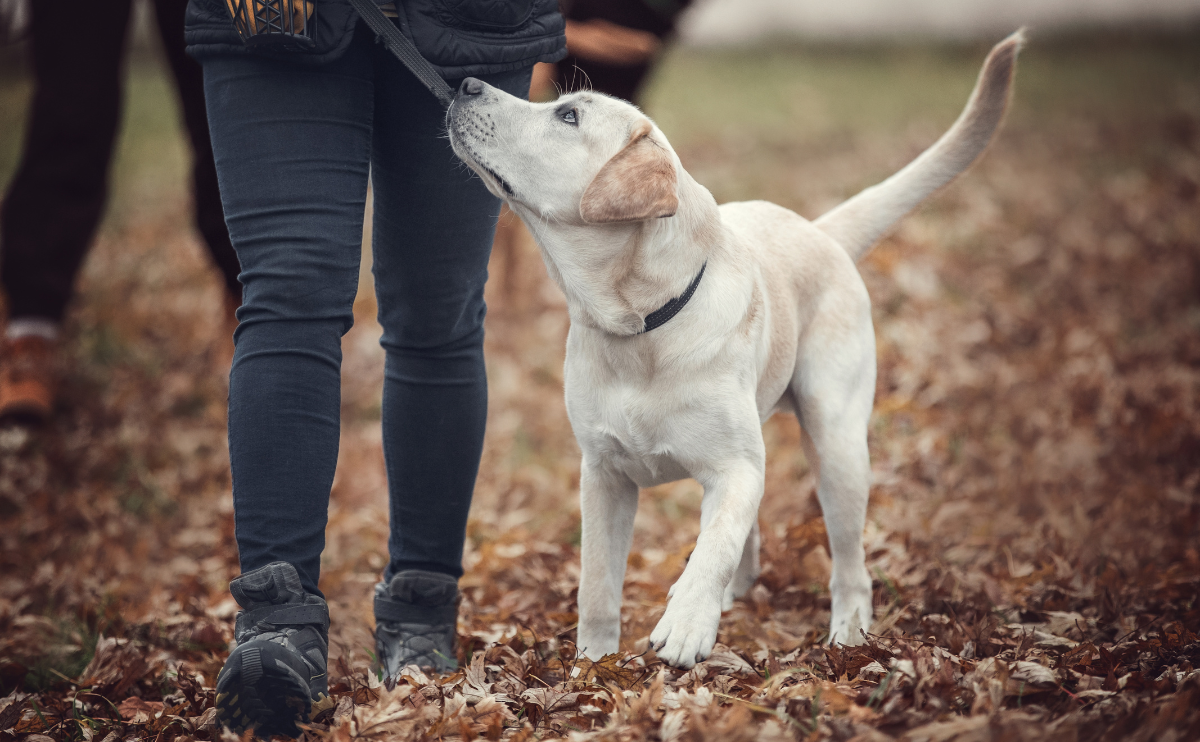
Why Do Puppies Eat Poop?
Puppies are interested by every part — sticks, socks, useless leaves, and sure, poop. Exploration is a part of studying, and their mouths are like palms. On prime of that, many puppies copy their mother. Since mom canines lick and eat their puppies’ feces to maintain the den clear, the behavior typically carries over.
Most pups develop out of it as they mature, particularly with constant coaching and redirection. In case your pet is obsessed, rule out dietary points together with your vet and ensure boredom isn’t driving the conduct.
Why Does My Canine Eat Different Canine’ Poop On Walks, However Not At Residence?
Many homeowners discover this sample. At residence, your canine might ignore their very own poop, however on walks? Out of the blue, it’s a buffet. That’s as a result of different canines’ feces scent totally different and will comprise undigested vitamins or attractive scents from weight loss plan variations.
It’s additionally a novelty issue. At residence, the poop is predictable. On walks, it’s one thing “new.” Consider it like your canine ignoring kibble mud at residence however begging for desk scraps once you’re out to eat.
Is Consuming Poop Dangerous To My Canine?
It may be. Not all poop is created equal. Your canine may get fortunate and haven’t any signs, however the dangers embrace:
- Parasites (roundworms, whipworms, hookworms)
- Micro organism (Salmonella, Campylobacter, E. coli)
- Viruses (parvovirus, adenovirus)
Even when signs don’t present straight away, a vet can examine for parasites or infections earlier than they escalate.
Why Does My Canine Eat Cat Poop, Too?
When you’ve got cats at residence, you’ll have observed your canine raiding the litter field prefer it’s a snack bar. Cat poop is very interesting as a result of feline diets are greater in protein and fats. To your canine’s nostril, it smells like concentrated kibble.
Except for being gross, it’s dangerous. Cat feces can carry Toxoplasma gondii and different parasites. The answer? Cowl or relocate the litter field so your pup can’t entry it.
How Do I Cease My Canine From Consuming Poop Exterior?
Prevention is a mixture of coaching, administration, and typically weight loss plan tweaks:
- Prepare “go away it” so you may redirect mid-walk.
- Use a brief leash in high-risk areas like canine parks.
- Choose up poop shortly you probably have a number of canines at residence.
- Ask your vet about probiotics or digestive enzymes if nutrient absorption is a priority.
Consistency is essential. Each time you efficiently redirect your canine and reward them, you’re educating them that poop just isn’t value it.
Ought to I Punish My Canine For Consuming Poop?
No, punishment typically backfires. Canine don’t join the punishment to the act the way in which we expect they do. Actually, scolding might improve stress and make the issue worse.
As a substitute, use optimistic reinforcement. Catch your canine ignoring poop? Reward and reward. Prepare different behaviors like “go away it” or “take a look at me.” Over time, they’ll study poop is boring in comparison with treats and reward.
Why Cease At Poop? Different Bizarre Issues Canine Eat
When you’ve ever puzzled why your canine eats issues they actually shouldn’t, you’re not alone. We’ve acquired guides on vomit-eating, dirt-snacking, and different unusual canine cravings. As a result of with regards to canines, “gross” is usually simply one other phrase for “regular.”
Uninterested in taking part in poop police on walks? With the right combination of coaching, administration, and vet perception, you may lastly break the behavior. Share your individual poop-eating tales (and wins!) within the feedback. We’d love to listen to the way you’re tackling it.

